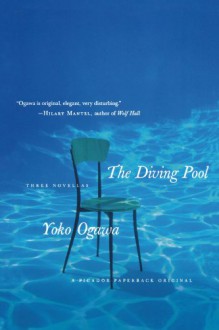
Well, if I ever want acid indigestion, I know just the book to turn to.
I've been very lucky this past year with contemporary Japanese authors, and Yoko Ogawa has been one of the top on that list. This novella features three standalone stories, all united by recurring themes. In each story, the main characters assume the role of the incongruous outsider, distant and apathetic, but frothing underneath with violent undercurrents of obsession and desire.
Perhaps most significantly, these outsiders are all female, each seeking companionship but falling just short of getting it. Isolation is a running thread in the three stories, and it is through the lens of isolation that Yoko Ogawa warps each protagonist's view of her world. Beauty is perverted into revulsion. The human aesthetic is reduced to a scientific specimen. Repressed sexual desire, oftentimes misplaced or unrequited, is expressed through sadism and abuse.
The most compelling aspect of this novella was just how capable of casual cruelty we are in everyday life, particularly in the first two stories, and how powerful and maddening isolation can become.
I planned on finishing this book in one or two sittings because of its relatively short length. But after reading the unsettling, mind bending first story that was The Diving Pool, also the title of the book, I realized I could only take this book in bite-sized pieces (and if you’ve read The Diving Pool, you’ll know how ironic that statement is).
THE DIVING POOL
After reading this story, I just wanted to curl up in a fetal position and rock back and forth. I actually had to set this book down a few times after reading some particularly disturbing passages.
Out narrator is Aya, the daughter of a husband and wife who run an orphanage. Despite being her parent’s sole biological child, Aya is still treated like an orphan, exacerbating her feelings of displacement and isolation. Aya’s one comfort is secretly watching Jun, her foster brother, dive at the local pool and reveling in his sleek physique and elegant form. However, as Jun is technically Aya’s “brother” and her increasingly obsessive feelings can never be requited, Aya alleviates her emotional frustrations in sadistic and grotesque ways.
What struck me most about this story was how seamlessly the author wove cruelty into the narrative. It seemed almost like a natural human reaction simply because of its selfishness and the longing that drove it. This was a gem of a story, albeit a haunting and disturbing one.
Story rating: 5/5
THE PREGNANCY DIARIES
While The Diving Pool revolves around the psychological workings of a young girl, this story draws inspiration from physical, commonplace things like pregnancy, ultrasound imaging, and food. However, despite its reliance on the physical world, the story has a surreal quality about it, as if it were a dream laced with nightmares.
Similar to The Diving Pool, the protagonist is a cool, detached woman who lives with her pregnant sister and brother-in-law. Already the proverbial third wheel, the narrator further emphasizes her alienation in her journal entries that detail the progress of her sister’s pregnancy. But rather than the musings of a concerned sibling, the entries have a cold, stilted quality that tips off that reduces pregnancy into something repulsive and gluttonous.
One of the ways the narrator does this is through her descriptions of food. Food is never just food. It is in turns fragrant and tasty, slimy and revolting, poisonous and corruptive. The narrator’s pregnant sister goes so far as comparing noodles to tiny intestinal tracts.
Like Aya in the previous story, the narrator never expresses her emotions outright, but the darkness of her observations hint at a boiling resentment. Again, cruelty sinks into the narrative like a subtle poison. It’s a disorienting feeling, one that keeps you on the edge of your toes in expectation of the dire consequences such resentment can bring about.
Story rating: 4.5/5
DORMITORY
I’d have to say Dormitory was the least surreal of the three, and while the theme of isolation permeates the story, the main conflict resolves itself very differently.
Again, the main character is a woman. While waiting for her husband to call her to Sweden, she remains in Japan to pack and settle their affairs before she leaves the country. When she gets a request from her cousin to find housing, however, the woman recommends him to live in an old dormitory run by a paraplegic man, a place in which she had lived years earlier. The story quickly morphs into something resembling a mystery at the dormitory as the woman increasingly shuts out her distant husband and focuses more on her young cousin.
Unlike the previous two stories, there are barely any mentions of food or graphic cruelty. The outer layer of the story is a murder mystery in a strange, offbeat environment. But Yoko Ogawa flips the murder mystery genre on its head at the very last page, instead posing questions about the nature of self and its lonely drive toward madness.
Though the least shocking and toned down, I thought this was probably the most carefully crafted story of the three.
Story rating: 5/5
Overall, these stories were not comfortable reads. But they have a strange and disturbing pull, an elegant allure that does not let you look away. Despite my own fanfare, I hesitate to recommend this book to everyone just because of its subject matter and the bizarre circumstances in which certain topics are addressed.
However, if you’re in the mood for something that will disturb and shock you from your daily routine, definitely think about reading this book.
5 STARS AND HIGHLY RECOMMENDED, though with reservations.

 Log in with Facebook
Log in with Facebook 





